- Home
- Tahereh Mafi
This Woven Kingdom Page 7
This Woven Kingdom Read online
Page 7
Alizeh blinked, then stepped back. It was Mrs. Sana staring at her, the bespectacled housekeeper from the Lojjan ambassador’s estate.
Stunned as she was, Alizeh nearly forgot to curtsy.
Housekeepers, who ruled their own little kingdoms, were not considered servants and did not wear snodas; as a result, they were due a level of respect that Alizeh was still learning. She bobbed a curtsy, then straightened.
“Good afternoon, ma’am. How may I help you?”
Mrs. Sana said nothing, only held out a small purse, which Alizeh accepted in her injured hand. She felt the weight of the coin at once.
“Oh,” she breathed.
“Miss Huda was very pleased with the dress and would like to engage your services again.”
Alizeh went suddenly solid.
She dared not speak, dared not move for fear of ruining the moment. She tried to remember if she’d fallen asleep, if perhaps she was dreaming.
Mrs. Sana rapped her knuckles on the doorframe. “You’ve gone deaf, girl?”
Alizeh took a sharp breath. “No, ma’am,” she said quickly. “That is—yes, ma’am. I would— It would be my honor.”
Mrs. Sana sniffed at her, in a way that was becoming familiar. “Yes. I daresay it would be. And you’ll remember it the next time you speak ill of my mistress. She meant to send her maid, but I insisted on delivering the message myself. You understand my meaning.”
Alizeh lowered her eyes. “Yes, ma’am.”
“Miss Huda will need at least four gowns for the upcoming festivities, and one showpiece for the ball.”
Alizeh’s head snapped up. She did not know to which upcoming festivities Mrs. Sana was referring, and she did not care. “Miss Huda wants five gowns?”
“Will that be a problem?”
Alizeh heard a roar in her ears, experienced a terrifying disorientation. She worried she might cry, and she did not think she’d forgive herself if she did. “No, ma’am,” she managed to say. “No problem at all.”
“Good. You may come to the house tomorrow at nine in the evening.” A heavy pause. “After you finish your shift here.”
“Thank you, ma’am. Thank you. Thank you for und—”
“Nine o’clock sharp, you understand?” And Mrs. Sana was gone, the door slamming shut behind her.
Alizeh could hold it in no longer. She slid to the floor and sobbed.
Nine
IN THE MILKY EYE OF the moon the silhouettes of passersby merged into one gelatinous mass rumbling with sound; raucous cries rang out, laughter tearing through trees, lamplight flickering as people stumbled through the streets. The night was pure madness.
Alizeh suppressed a shudder.
It disturbed her always to be enveloped by the dark, for it brought to life a fear of blindness she could not fully rationalize. Her ancestors had once been sentenced to an existence without light or heat—she knew this, yes—but that she should carry the fear still struck her as most peculiar. Worse, it seemed her strange fate to be tethered always to the dark, for these days she moved most freely through the world only in the absence of daylight, when the yoke of duty had been removed.
Alizeh had emerged from Baz House long after the sun had been extinguished, and though the good news of more work for Miss Huda had done a great deal to buoy her spirits, Alizeh was burdened anew by the state of her hands. The day’s tasks had torn fresh wounds into her already split palms, and the strips of fabric she’d carefully wrapped around her injuries had grown damp and heavy with blood. Alizeh, who now needed to create five gowns in addition to performing her regular duties, suddenly required her hands more than ever—which meant her journey to the apothecary could not wait until tomorrow.
It was on aching feet that Alizeh dredged through the evening’s snowfall, arms tight against her chest, chin tucked into her collar. Frost grew steadily along the wet tendrils of her hair, unruly strands whipping in the wind as she went.
Already Alizeh had paid a visit to the local hamam, where she’d washed the day’s filth from her body. She always felt better when she was clean, and though the task had cost her physically, she felt it ultimately worthwhile. More: the night air was bracing, and the cold shock to her uncovered head kept her thoughts focused. Alizeh required a sharpness of mind never more than when she walked the streets at night, for she knew well the dangers posed by desperate strangers in the dark. She was careful to remain quiet as she moved, keeping to the light, and to herself.
Still, it was impossible to ignore the uproar.
People were chanting in the streets, some singing, some yelling, all too drunk to be understood. There were large crowds dancing, all of them working together to hold aloft what appeared to be a scarecrow; the straw figure wearing a crude iron crown. Masses of people were sitting in the middle of the road smoking shisha and drinking tea, refusing to clear the streets even as horses whinnied, carriages teetered, and noblemen emerged from the plush interiors of their conveyances shouting and brandishing whips.
Alizeh walked through a cloud of apricot-flavored smoke, shook off an evening peddler, and pushed through a narrow gap in a group laughing uproariously at the story of a child who’d caught a snake in its hands and, delighted, had dipped the serpent’s head over and over again into a bowl of yogurt.
Privately, Alizeh smiled.
Some people, she noticed, were carrying signs—some held high, others dragging behind like a dog on a leash. She tried to make out the printed words, but none could be deciphered in the dim, flickering light. One thing was for certain: this was an unusual level of merriment and madness, even for the royal city, and for a moment Alizeh’s curiosity threatened to overcome her better senses.
She tamped it down.
Strangers jostled her, a few swiping at her snoda, laughing in her face, stepping on her skirts. She’d learned long ago that servants of her station were the most universally despised, considered fair game for all manner of cruelty. Others in her position were eager to remove their snodas in public spaces for fear of drawing unwanted attention, but Alizeh could not remove her snoda without great risk to herself; though she felt certain she was being hunted, she did not know by whom, which meant she could never let down her guard.
Alizeh’s face was—unfortunately—too easily remembered.
Hers was the rare exception; it was otherwise difficult to spot the difference between Jinn and Clay, as Jinn had thousands of years ago regained not only their vision but the varying levels of melanin in their hair and skin. Alizeh, like many in Ardunia, had yards of glossy, coal-black curls and an olive complexion. But her eyes—
She did not know the color of her eyes.
Occasionally they took on the familiar brown of burnt umber, which she believed to be the natural color of her irises, but more often her eyes were a piercing shade of ice blue, so light they were hardly a color at all. It was no wonder then that Alizeh lived always with a perpetual chill, one she felt even in the sockets of her eyes. Ice sluiced through her clear veins even in the pit of summer, immobilizing her in the way she imagined only her ancestors could understand, for it was from them that she’d inherited this irregularity. The resulting effect was so disorienting few could bear to look at the girl—and yet, Alizeh’s face might’ve been more readily ignored had her irises only ceased to change shades, which they had not. Instead, they flickered, alternating color constantly; it was a problem over which she had no control, and whose provocation she did not understand.
Alizeh felt a touch of moisture on her lips then and looked up. Fresh snow had begun to fall.
She pulled her arms tighter across her chest and darted down a familiar road, her head bowed against the wind. She’d been growing slowly aware of a pair of footsteps behind her—unusual only in their consistency—and felt a frisson of fear, which she forcefully dismissed. Alizeh felt she was growing too easily paranoid of late, and besides, the glow of the apothecary’s shop was just up ahead. She sprinted toward it now.
A bell c
himed as she pushed open the wooden door, and she was nearly shoved right back out by the crowd jammed within. The apothecary was unusually busy for the hour, and Alizeh could not help but notice that its standard aroma of sage and saffron had been exchanged for the mephitic vapors of unwashed latrines and aged vomit. Alizeh held her breath as she took her place in line, resisting the urge to stamp the snow from her boots on the rug underfoot.
Present clientele were shouting obscenities at each other, jostling for space while cradling fractured arms and broken noses. Some were dripping red blood from the crowns of their heads, their mouths. One man was presenting a child with the bloody tooth he’d plucked from his head, a souvenir from another who’d thought to bite his skull.
Alizeh could scarcely believe it.
These people needed baths and surgeons, not an apothecarist. She could only imagine they were either too stupid or too drunk to know better than to seek aid here.
“All right, enough,” boomed an angry voice over the crowd. “The lot of you: get out. Out of my shop before you—”
There was the abrupt sound of glass shattering, vials knocking to the ground. The same booming voice shouted renewed epithets as the crowd grew only more agitated, and there was a veritable stampede for the door when he brandished a cane and threatened not only to horsewhip the group of them, but to turn them over to the magistrates on charges of public indecency.
Alizeh flattened herself as best she could against the wall, so successful in her aim that when the horde had finally cleared, the shopkeeper almost missed her.
Almost.
“Get out,” he barked, advancing on her. “Get out of my store, out, you heathen—”
“Sir— Please—” Alizeh shrank back. “I’m here only for some salve and bandages. I’d be terribly grateful for your help.”
The shopkeeper froze, the angry expression still etched onto his face. He was a narrow man, tall and wiry, with dark brown skin and coarse black hair, and he very nearly sniffed her. His assessing eyes took in her patched—but clean—jacket, the tidiness of her hair. Finally he took a deep, steadying breath, and stepped away.
“All right, then, what’ll it be?” He moved back around the main counter, staring down at her with large, ink-dark eyes. “Where’s the damage?”
Alizeh clenched her fists, stuffed them in her pockets, and tried to smile. Her mouth was the only part of her face unobscured, and it was as a result a point of focus for most people. The apothecarist, however, seemed determined to stare at her eyes—or, where he thought her eyes might be.
For a moment, Alizeh was unsure what to do.
It was true that, from the outside, Jinn were mostly undetectable. It was in fact their stunning physical resemblance to Clay that had made them the biggest threat, the more difficult to suspect. The Fire Accords had attempted to bring organization to these sorts of problems, but under the veneer of peace there remained always an uneasiness among the people—an ingrained hatred of their kind, of their imagined association with the devil—that was not easily forgotten. Presenting strangers with clear proof of her identity had always inspired in Alizeh a halting fear, for she never knew how they might react. More often than not, people could not hide their contempt; and more often than not, she did not have the energy to face it.
Quietly, she said, “I’ve only a few scrapes on my hands that need tending—and a few blisters. If you’ve fresh bandages and a salve you’d recommend, sir, I’d be most obliged.”
The apothecarist made a sound in his mouth, something like a tsk, drummed his fingers on the counter, and turned to study his walls; the long wooden shelves housed stoppered bottles of untold remedies. “And what of your neck, miss? The cut there seems severe.”
Unconsciously, Alizeh touched her fingers to the wound. “I beg—I beg your pardon, sir?”
“You have a laceration at your throat, of which I doubt you’re unaware. You must be feeling the pain at the incision, miss. The wound is likely warm to the touch, and”—he peered closer—“yes, it looks like there’s a bit of swelling. We must get ahead of any major infection.”
Alizeh went suddenly rigid with fear.
The Fesht boy had cut her with a crude, dirty blade. She’d seen it herself, had examined the tool in her own hand; why had she not realized there’d be consequences? Certainly, she’d been unwell and in pain all day, but she’d compartmentalized the sensations, experiencing it all as one large unpleasantness. She’d never had a chance to pinpoint the many discrete origins of her discomfort.
Alizeh squeezed her eyes shut and grabbed at the counter, steadying herself. She could ill afford much of anything these days, but she could least afford to be sick. If she caught a fever—if she could not work—she would be turned out onto the street, where she’d doubtless die in the gutter. It was this cold reality that propelled her actions every day, this larger instinct that demanded she survive.
“Miss?”
Oh, the devil always did know when to pay a visit.
Ten
KAMRAN STOOD IN THE SHADOW of a shuttered storefront, the hood of his cloak whipping in the wind, snapping against his face like the leathery wings of a bat. The snow had softened to rain, and he listened to the drops pop along the awning overhead, watched as they pelted the white drift frosting the streets. Long minutes passed, piles of snow perforating, then dissolving at his feet.
He should not have come.
After their meeting, the king had taken Kamran aside to ask further questions about the suspected servant girl, questions Kamran only too gladly answered, having felt validated by his grandfather’s concern. It was in fact at the king’s behest that Kamran was to continue his inquiries into the girl’s whereabouts, for Zaal, too, had seemed perturbed upon hearing a more detailed accounting of the morning’s events. He’d dispatched the prince into town to fulfill various obligations—among them a visit to the Fesht boy—and to then surveil the city.
Naturally, Kamran had obliged.
A focused task was precisely what he needed, as it would allow him a reprieve from his own mind, from the weight of all that his grandfather had recently imparted. The prince had thought to see the mobs for himself, in any case; he wanted to hear the commotion he had caused, to bear witness to the consequences of his actions.
In the end, it had led to this: darkness.
No, he should not have come at all.
First was his visit to the street child, who’d been installed at the Diviners Quarters in the Royal Square. The king had made it clear to Kamran that to ignore the boy now would make his earlier actions appear rash and hotheaded. Subsequent actions of care and compassion toward the boy would not only be expected, Zaal had said, but anticipated, and as Kamran already owed the Diviners a visit, it had not seemed too great a waste of his time.
Instead, it had been infuriating.
As it turned out, magic alone had saved the boy from the brink of death. This revelation, which should have been a relief, was to the prince grim news indeed, for it had been upon his perceived orders that the Diviners had acted—and rarely, if ever, was magical assistance offered to any outside the imperial family.
Vast though Ardunia was, magic as a substance was exceptionally rare. The unstable mineral was mined from the mountains at great risk, and as a result existed only in small, precious quantities, meted out only by royal decree. Kamran’s call for help had been interpreted as just that; marking yet another reason why his actions toward a thieving street urchin had been so significant, and would not be easily forgotten.
He sighed at the reminder.
Though the boy was healing still, he’d managed to flinch when Kamran arrived in his room. The child had inched backward in his bed as best he could, scrambling out of reach of his unlikely savior. They both knew it; knew that the scene within which they’d been trapped was a farce; that Kamran was no hero; that there existed no amity between them.
Indeed, Kamran felt nothing but anger toward the boy.
Thr
ough the careful dissemination of new rumors, the crown had actively sought to distort the story of the street urchin; King Zaal decided it would be more difficult to convince an audience that the prince had done good by saving a murderous child, and so had modified the tale to exclude any mention of harm done to the servant girl. This bothered Kamran far more than it ought, for privately he felt the rascal deserved neither the efforts made to spare him, nor the care he received now.
Carefully, Kamran had approached the boy’s bed, claiming a small victory as fear flared to life in the child’s eyes. From this he gained impetus enough to hone his frustration, which gave his visit focus. If the prince was to be forced into the company of this disgraceful child, he would use the opportunity to demand answers to his innumerable questions.
By the angels, he had questions.
“Avo, kemem dinar shora,” he’d said darkly. First, I want to know why. “Why did you beg me not to hand you over to the magistrates?”
The boy shook his head.
“Jev man,” Kamran had said. Answer me.
Again, the boy shook his head.
Kamran stood sharply, clasping his hands behind his back. “You and I both know the real reason you are here, and I will not soon forget it. I have no interest in forgiving you for your actions today merely because you nearly died in the effort. You would’ve murdered a young woman just to steal her wares—”
“Nek, nek hejjan—” No, no, sire—
“And were willing to kill yourself so you would not have to stand trial—so you would not be turned over to the magistrates and pay the price for your debased actions.” Kamran’s eyes flashed with barely suppressed anger. “Tell me why.”
For the third time, the child shook his head.
“Perhaps I will turn you over to the magistrates now. Perhaps they might be more effective at yielding results.”
“No, sire,” the boy had said in his native tongue, his brown eyes large in his sunken face. “You would not do that.”

 Shatter Me
Shatter Me Restore Me
Restore Me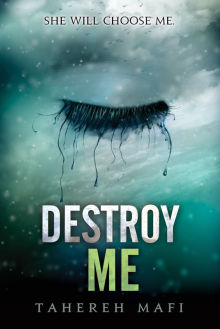 Destroy Me
Destroy Me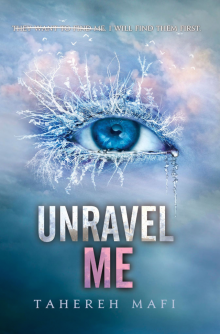 Unravel Me
Unravel Me Ignite Me
Ignite Me Defy Me
Defy Me Fracture Me
Fracture Me Shadow Me
Shadow Me Whichwood
Whichwood Reveal Me
Reveal Me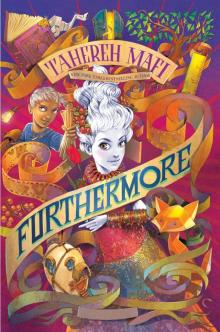 Furthermore
Furthermore Shadow Me (Shatter Me Novella)
Shadow Me (Shatter Me Novella)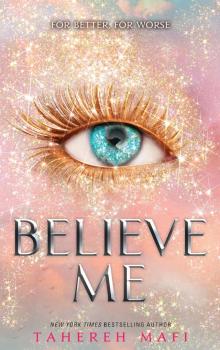 Believe Me
Believe Me Restore Me (Shatter Me)
Restore Me (Shatter Me)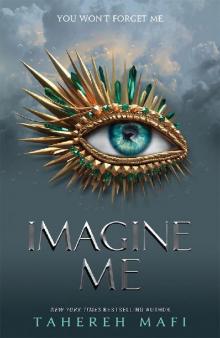 Imagine Me
Imagine Me An Emotion of Great Delight
An Emotion of Great Delight Find Me
Find Me A Very Large Expanse of Sea
A Very Large Expanse of Sea Unravel Me: The Juliette Chronicles Book 2
Unravel Me: The Juliette Chronicles Book 2